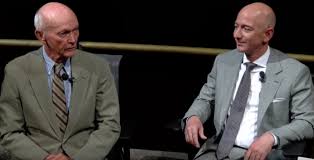Page-7 Public image of Jeff Bezos

Public image of Jeff Bezos:– Journalist Nellie Bowles of The New York Times has described the Public Persona and personality of Bezos as that of “a brilliant but mysterious and coldblooded corporate titan”. People love Jeff Bezos because of their nature and works.
During the 1990s, Bezos earned a reputation for relentlessly pushing Amazon forward, often at the expense of Public Charity and social welfare. His business practices projected a public image of Prudence and parsimony with his own wealth and that of Amazon.
Bezos was a multi-billionaire who hung his clothes on a rack in his Amazon headquarters office and drove a 1996 Honda Accord. Throughout the early 2000s, he was perceived to be geeky or nerdy, which went over well with observers.
Bezos was seen by some as needlessly quantitative and data-driven. This perception was detailed by Alan Deutsch’s man who described him as “talking in lists” and “[enumerating] the criteria, in order of importance, for every decision he has made.” Select accounts of his persona have drawn controversy and public attention.
Notably, journalist Brad Stone wrote an unauthorized book that described Bezos as a demanding boss as well as hyper-competitive. Bezos has been stereotyped as a notoriously opportunistic CEO who operates with little concern for obstacles and externalities This depiction has been challenged by Bezos himself, his then-wife, Mackenzie, Amazon employees, and the public as a mischaracterization.
During the early 2010s, the Public image of Jeff Bezos for aggressive business practices, and his public image began to shift. Bezos started to wear tailored clothing; he weight trained, pursued a regimented diet, and began to freely spend his money. His physical transformation has been compared to the transformation of Amazon; he is often referred to as the metonym of the company.
His physical appearance increased the public’s perception of him as a symbolically dominant figure in business and in popular culture, wherein he has been parodied as an enterprising super Villain Since 2017, he has been portrayed by Kyle Mooney and Steve Carell on Saturday Night Live, usually as an undercutting, domineering figure. Bezos eats exotic foods, such as octopus and roasted iguana.
Public image of Jeff Bezos after May 2014,
In May 2014, the International Trade Union Confederation named Bezos the “World’s Worst Boss”, with its general secretary Sharan Burrow saying: “Jeff Bezos represents the inhumanity of employers who are promoting the North American corporate model.” This event damaged the Public image of Jeff Bezos.
During the late 2010s, Bezos reversed his reputation for being reluctant to spend money on non-business-related expenses. His relative lack of philanthropy compared to other billionaires has drawn a negative response from the public since 2016. Bezos has been known to publicly contest claims made in critical articles, as exemplified in 2015 when he sent a memo to employees denouncing a New York Times piece.
Bezos used what he called a “regret-minimization framework” while he worked at D.E.Shaw and again during the early years of Amazon. He described this life philisophy by stating: “When I’m 80, am I going to regret leaving Wall Street?
No. Will I regret missing the beginning of the Internet?
Yes.” During the 1990s and early 2000s at Amazon, he was characterized as trying to quantify all aspects of running the company, often listing employees on spreadsheets and basing executive decisions on data.
To push Amazon forward, Bezos developed the mantra “Get Big Fast”, which spoke to the company’s need to scale its operations and establish market dominance. He favored diverting Amazon profits back into the company in lieu of allocating it amongst shareholders in the form of dividends.
He meets with Amazon investors for a total of only six hours a year. Instead of using powerpoints, Bezos requires high-level employees to present information with six-page narratives.
Starting in 1998, Bezos publishes an annual letter for Amazon shareholders wherein he frequently refers to five principles: focus on customers, not competitors, take risks for market leadership, facilitate staff morale, build a company culture, and empower people. Bezos maintains the email address “jeff@amazon.com” as an outlet for Buffett (of Berkshire Hathaway), Jamie Dimon (of JPMorgan Chase), and Bob Iger (of Walt Disney) as major influences on his leadership style.
Public Image of Jeff in 2020-21
Coming Soon
Now Jeff slip in second position in riches persons list.
You can also read this,
- https://news-fair.com/who-is-the-jeff-bezos-how-they-create-wealth-how-they-grow-in-his-life-2/
- https://news-fair.com/who-is-the-jeff-bezos-how-they-create-wealth-how-they-grow-in-his-life/